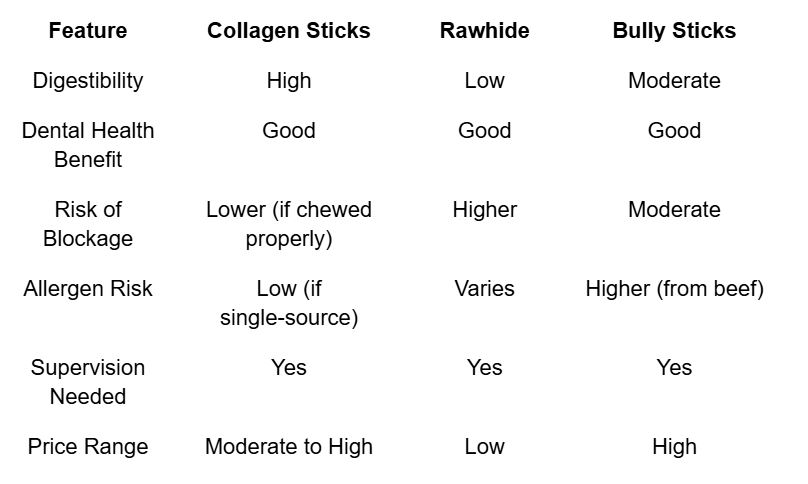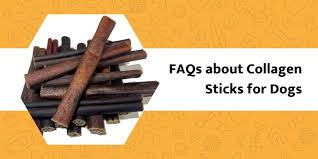Yes, many veterinarians do recommend collagen sticks for dogs — but only under the right circumstances. When sourced properly and given in moderation, collagen chews can support joint health, skin condition, and dental hygiene, but pet owners must be discerning with product quality and usage.
Do Vets Recommend Collagen Sticks for Dogs?

When scrolling through pet treat aisles or online shops, it’s easy to be lured in by labels like “vet-recommended” or “all-natural.” Collagen sticks for dogs have surged in popularity, marketed as a safer, more beneficial alternative to rawhide. But are they really backed by veterinary professionals?
This blog post by Careers Collectiv, a provider of professional courses in animal care, takes a deep dive into the facts surrounding collagen chews. We explore what veterinarians actually say, the science behind collagen, and how to make informed choices for your dog’s wellbeing.
What Does “Vet Recommended” Really Mean?

Pet product labels often feature vague endorsements like “vet-approved,” but what does that actually imply?
Key Considerations:
- Marketing vs. Medical Endorsement
“Vet-recommended” doesn’t always mean the product was reviewed in a clinical context. Sometimes, it’s based on marketing claims, not formal studies. - Lack of Regulation
Unlike human supplements, pet treats face fewer regulations. This allows manufacturers to use terms like “veterinarian-approved” without third-party validation. - Consumer Misconceptions
Pet owners may believe such claims mean safety or efficacy is guaranteed, but often, these terms are unregulated and loosely defined.
What to Look For Instead:
- Clear sourcing and ingredient transparency
- Products recommended by your own veterinarian
- Backing from veterinary organisations or peer-reviewed studies
Collagen for Dogs

Collagen isn’t just hype — it’s one of the most abundant proteins in your dog’s body. But can a collagen stick really make a difference?
Benefits Supported by Research:
- Joint Health
Type II collagen supports cartilage regeneration and may help dogs with arthritis or aging joints. - Skin and Coat Support
Collagen plays a role in maintaining skin elasticity and coat shine.
Digestibility
Compared to rawhide, collagen sticks are generally easier on the stomach due to partial hydrolysis during processing.
Collagen Sticks vs Other Chews: Which Is Safer?
Pet owners often ask: Are collagen sticks actually better than rawhide or bully sticks?

Bottom Line:
Collagen sticks strike a balance between safety and functionality — but only when chosen wisely.
Are Collagen Sticks Safe? Risks You Haven’t Heard

Despite the benefits, collagen sticks come with potential downsides, especially when misused.
Known Risks:
- Choking Hazard:
Dogs that don’t chew thoroughly may swallow large chunks. - Digestive Upset:
Introducing collagen too quickly can result in soft stools or diarrhea. - Allergic Reactions:
Dogs with beef, chicken, or fish allergies should avoid collagen from those sources.
Safety Tips:
- Always monitor your dog during chewing sessions.
- Select the correct stick size for your dog’s breed.
- Avoid feeding more than a few times per week.
- Introduce slowly to check for tolerance.
How to Choose the Right Collagen Product

Not all collagen sticks are made equal. Here’s how to pick a safe, effective product:
Checklist for Choosing Quality Collagen Sticks
- Made from grass-fed or pasture-raised animal sources
- Single-ingredient or minimal ingredients
- No artificial preservatives or coloring
- Manufactured in a regulated facility
- Third-party tested for safety and digestibility
- Labeled according to your dog’s weight and chew strength
Brands that meet most of these criteria tend to be more expensive — but they’re also more trustworthy.
Better Alternatives to Collagen Sticks

Looking for other ways to support your dog’s joints or provide chew satisfaction?
Viable Alternatives:
- Collagen Powder for Dogs
Easy to mix into food; controlled dosage. - Glucosamine & Chondroitin Tablets
Proven joint support combo backed by veterinary studies. - Dental Chews (VOHC approved)
Formulated specifically for oral health. - Frozen Carrots or Sweet Potatoes
Affordable, natural chew options for light chewers. - Benebones
Durable, long-lasting chew toys that satisfy your dog’s urge to gnaw while supporting dental health.
Meal Toppers with UC-II
Can enhance mobility and flexibility, especially in senior dogs.
Top FAQs About Collagen Sticks for Dogs
Are collagen sticks safe for small dogs?
Yes, but only if appropriately sized and monitored during chewing.
How often should my dog have collagen chews?
2–3 times per week is generally safe. Check with your vet for a personalised plan.
Can puppies have collagen sticks?
Puppies under 6 months may struggle with digestion or choking. Wait until adult teeth come in.
Do vets recommend collagen for joint health?
Yes, particularly in older dogs or breeds prone to joint issues like Labradors, German Shepherds, and Bulldogs.
What is the daily collagen dosage for dogs?
This varies by weight, but most powders suggest 1 gram per 10 lbs of body weight daily.
Should You Trust Collagen Stick Hype?
Collagen sticks are not a miracle solution — but they aren’t snake oil either. When chosen carefully, they can be part of a thoughtful routine to support your dog’s joint, skin, and dental health.
At Careers Collectiv, we believe in equipping pet owners and future animal professionals with practical, evidence-based insights. If you’re considering collagen products for your dog, weigh the benefits against the risks, consult your vet, and always prioritise product quality.